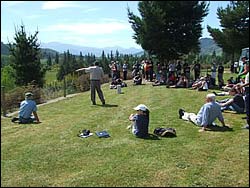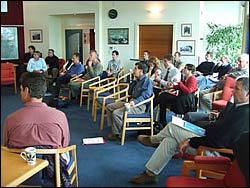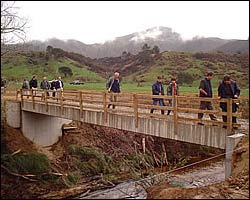Science uptake by councils
Research Status: Past |
ICM AGM 2005 - John Ellis place Kohatu |
Introduction
Stage 1 "Indicators of science uptake within Council" revealed a willingness by staff and management to tackle some of the issues of effective information sharing including "science uptake" within a learning framework. In practice, a collaborative "learning approach" involves getting staff reflecting more consciously on their own practice in relation to gathering, recording and using information, and on how they share their knowledge with others. In the past, the technical dimensions of "information management" have tended to predominate over social considerations (ie how people work together and how systems work in practice). The study to date has confirmed some emerging ideas in the science uptake and knowledge management literature regarding how organisations learn in practice. These ideas have not been applied in a natural resource management setting akin to Council, and extended out into the community.
Research Approach
Work with Environment and Planning Division, Tasman District Council, to develop a joint approach to addressing the issues raised in the workshop and report (in prep). Key elements are likely to include assistance by LCR in design and evaluation of a TDC sponsored learning process. For example, staff may develop and refine individual strategies for improving the way they plan, record and share information; they may develop these at a section level; and the sections may provide feedback to one another of how overall organisational improvement could be secured. Landcare and collaborators may be able to assist in developing this process.
The external reference group could be used to provide some external feedback on the process.
Integrate this work within other Landcare programmes and the ICM project as appropriate. In particular, the domain of the learning model could be extended to include a manageable number of key stakeholders including for example, Councillors, Fish and Game staff, NGO or community representatives, and representative landowners.
The framework and learning from stage 1 of this project will be documented as a working report and presented to a workshop or conference, jointly with collaborators as appropriate. The key target audience of the stage two project remains council staff, extended to Councillors and selected stakeholders. A workshop or series of review sessions could be held in which improvements and learnings could be shared and documented as appropriate. The external reference group may provide advice on opportunities and external audiences.
The outcome should contribute towards increased responsiveness of the ICM science programme and improved processes for collaboration and social learning in catchment management that is being used in the Tasman District. The lessons should be documented and available for use by other key end users.
Research Results
The relationship between the research providers and the TDC (all partners in the ICM research programme) has strengthened over the years since the programme began in 2000. We have periodically challenged that relationship at AGM's and at workshops where we have explored the relationships and sought ways to improve both the relationship and the actual use and uptake of information arising from the programme.
It is acknowledged that in many situations the pathway towards implementation of research results in a policy sense often takes several years. This poses some interesting future questions for ICM in general, and perhaps for how the science-land management policy interface interacts.
Since 2006 we have also started to link with other regional councils by assisting them understand what ICM is all about and helping them begin to implement ICM projects. Much of this has been facilitated by funding from the Envirolink fund that aims to assist a number of councils improve their access to science results and to scientists.
 |
 |
Gravel workshop at AGM 2006 |
Bridge opening at Frank & Lisa White's farm, Sherry River |
Recent Publications
Recent Presentations
BMPs, BEPs and Guidelines
| Title | Description |
| An Everyday Guide to the Resource Management Act Series |
From website: This is a series of guides about everyday matters under the RMA. Guides in this ...More » |
| Stormwater Best Practice Guide |
From website: This guide is for Audit purposes to show that Council, and more particularly the...More » |
| Good Practice Guide for Working with Local Government |
From guide: Provides useful information about local government, the Local Government Act 2002 ...More » |
| Your Guide to the Resource Management Act |
From guide: This guide cuts through the jargon and confusion sometimes generated about the RMA...More » |
| Guidelines for Subdivisions, Buildings and Plantings | The aim of this booklet is to provide guidelines and advice to ensure any new developments in the St...More » |
| A Guide to Preparing a Basic Assessment of Environmental Effects |
From website: An Assessment of Environmental Effects (AEE) must accompany each application for...More » |
| Permeability Guideline | A quick reference to district plan rules on permeability in response to complaints about increased s...More » |
| Code of urban subdivision– Section 4, Appendix B: Methods to prevent erosion and sediment loss | The Code of Urban Subdivision is a non–statutory document, which provides a guide to the servi...More » |
Primary Contacts:

|
Glen Lauder
Email Phone: +64 21 513161 |
Institute CommonGround |
Expertise Organisational processes and learning, multi-stakeholder facilitation, science uptake |
|
|
Steve Markham
Email Phone: 064 03 5443427 Fax: 064 03 5439524 |
Institute Tasman District Council |
Expertise Land, water management; resource management; policy planning |